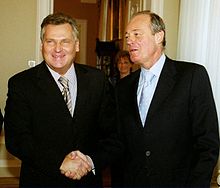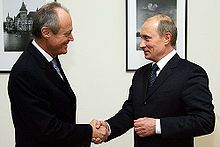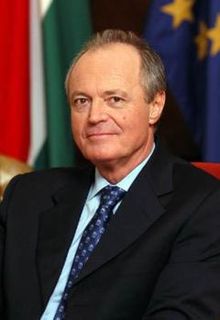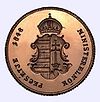- Péter Medgyessy
-
Péter Medgyessy Prime Minister of Hungary
5th Prime Minister of the Third Republic of HungaryIn office
27 May 2002 – 29 September 2004
(2 years, 125 days)President Ferenc Mádl Preceded by Viktor Orbán Succeeded by Ferenc Gyurcsány Minister of Finance In office
1 January 1987 – 15 December 1987Preceded by István Hetényi Succeeded by Miklós Villányi In office
1 March 1996 – 7 July 1998Preceded by Lajos Bokros Succeeded by Zsigmond Járai Personal details Born October 19, 1942
 Budapest, Hungary
Budapest, HungaryPolitical party independent (MSZMP until 1989) Spouse(s) Katalin Csaplár Profession Economist Website www.medgyessy.hu The native form of this personal name is Medgyessy Péter. This article uses the Western name order.Péter Medgyessy (Hungarian pronunciation: [peːtɛr mɛdɟɛʃːi] (
 listen); born October 19, 1942, Budapest) is a Hungarian politician and was the fifth Prime Minister of the Republic of Hungary from May 27, 2002 until September 29, 2004.[1] On August 25, 2004 he resigned over disputes with coalition partner Alliance of Free Democrats, but remained caretaker Prime Minister for a 30-day period as required by the Constitution, and a few additional days until his successor Ferenc Gyurcsány was confirmed by Parliament.[2][3]
listen); born October 19, 1942, Budapest) is a Hungarian politician and was the fifth Prime Minister of the Republic of Hungary from May 27, 2002 until September 29, 2004.[1] On August 25, 2004 he resigned over disputes with coalition partner Alliance of Free Democrats, but remained caretaker Prime Minister for a 30-day period as required by the Constitution, and a few additional days until his successor Ferenc Gyurcsány was confirmed by Parliament.[2][3]Contents
Studies
Born in Budapest, Medgyessy studied theoretical economics at the Corvinus University of Budapest (then called Karl Marx University of Economic Sciences).[4] He graduated in 1966, then returned to receive his doctorate. He is fluent in French and Romanian, and knowledgeable in the English and Russian languages.[4]
Political career
Early career
Between 1966 and 1982, he held various senior positions in departments of the Ministry of Finance. In 1982, he became Deputy Minister of Finance, and in 1987, he became Minister of Finance.
Between 1988 and 1990, Medgyessy was the Deputy Prime Minister for economic affairs, and between 1990 and 1996, he was CEO and Chairman of various Hungarian banks. After Gyula Horn took over the Hungarian government, Medgyessy returned to his previous position as Minister of Finance, in 1996. After his term ended, he became Chairman of the Board of Directors of the Inter-Europa Bank, and Vice President of Atlasz Insurance Company; he held these positions from 1998 to 2001.
He received the Commander's Cross with a Star of the Order of Merit in 1998, and the highest French decoration, the Chevalier of the Legion of Honour in 2000.
Prime Minister of Hungary
The Hungarian Socialist Party (MSZP) nominated him as their candidate for prime minister. The party won the 2002 elections, and on May 27, 2002, the Hungarian Parliament elected Medgyessy as the Prime Minister of Hungary.[4]
 Medgyessy with President of Poland Aleksander Kwasniewski.
Medgyessy with President of Poland Aleksander Kwasniewski.
Magyar Nemzet, a newspaper affiliated with the opposition party Fidesz, revealed in 2002 that Medgyessy had acted as a counterespionage officer under the code name D-209 in the III./II. section of the then Ministry for Internal Affairs prior to 1989. Medgyessy admitted to this, stating that his duties lay in the defense of Hungary from the KGB and securing Hungary's International Monetary Fund membership, which the Soviet Union opposed. However, given the political climate of the time, this is highly controversial.[5]
Under his prime ministership the 2003 Hungarian European Union referendum took place on 12 April 2003 to decide whether Hungary should join the European Union. All of the major political parties in Hungary, the trade unions, business oragnisations, churches and media supported membership of the EU.[6] Medgyessy announced the result at a celebration on the banks of the Danube telling them 'Allow me to officially announce that the Hungarian republic will be a member of the European Union.'
On August 19, 2004, due to impaired confidence in him by the coalition partner Alliance of Free Democrats (SZDSZ), he declared his resignation. His party, the MSZP accepted it on the same day, so in effect the government bowed out, which is without precedent in the history of Hungary's young democracy. The resignation took effect on August 25, and in accordance with the Hungarian Constitution he became "acting Prime Minister" for the next 30 days. In the meantime his successor, Ferenc Gyurcsány, acted on his behalf. Medgyessy stepped down as Prime Minister in August 2004 and was succeeded by Gyurcsány.[7]
Controversies
He was one of the primary humour sources of the press because of his weak rhetorical abilities and his style during his governance. From his mistakes and his bad draughtings a book was published with a title of Medgyessyizmusok (Medgyessyism, in analogy to Bushism).[8]
 Medgyessy with Vladimir Putin
Medgyessy with Vladimir Putin
Referring to Hungarian exporters' interests, he opted[when?] to decrease the central value of the floating exchange rate range of the forint. Investors regarded this as an incomprehensible step and a flawed piece of economic policy and started selling forints and Hungarian government bonds, which led to considerable interest rate hikes by the National Bank of Hungary.[citation needed]
Fulfilling the promise of "Change of welfare regime", the slogan of his campaign in the 2002 elections, the Medgyessy government increased wages of civil servants by 50%, and increased allowances for university students and pensioners, the latter group also receiving a one-time pension supplement. Economists criticised this move, calling it an irresponsible drain on the budget, amounting to nearly 190 billion Forints,[9] in their opinion purely to increase the administration's popularity.[10]
During his government, political attacks were launched against some independent senior civil servants who had been appointed by the previous Viktor Orbán cabinet. Court rulings subsequently established that the head of the Hungarian Energy Office and the chairman of the Hungarian Statistical Office were removed from their positions unconstitutionally and illegally. The chief of the Hungarian Financial Supervisory Authority was removed without legal challenge, however without any material basis related to his performance in office.[11][12]
Life since government
After his resignation, he continued to serve as a Member of Parliament in the role of travelling Ambassador, "to make sure Hungary can become a successful member of the most important international alliances including the European Union", as he stated. He was called back from this position by Ferenc Gyurcsány in mid-2008, after he openly criticized the government in some of his interviews.[13]
Personal life
He is married to Katalin Csaplár. He has a daughter born in 1969 and a son born in 1970 from a previous marriage. His adopted child is Anita Tornóczky, a well-known anchorwoman in Hungary.[14]
Awards and merits
He received the Commander's Cross with a Star of the Hungarian Order of Merit in 1998, and the highest French decoration, the Chevalier of the Legion of Honour in 2000. In 2002 he received the Grand Cross of the Belgian Order of the Crown and the Gold and Silver Star of the Japanese Order of the Rising Sun, and in 2003, the Grand Cross of the Order of the Merit of Chile and the Royal Norwegian Order of St. Olav. In 2004 he became a Grand Officer of the French Lggion of Honour and received the German Federal Cross of Merit.[15]
References
- ^ Mo Hong'e (2009-03-22). "Profile: Hungarian PM Ferenc Gyurcsany". Xinhua. http://news.xinhuanet.com/english/2009-03/22/content_11051592.htm.
- ^ Index (2004-08-18). "Az SZDSZ megvonta a bizalmat Medgyessytől". Index.hu. http://index.hu/belfold/kormatal0818/.
- ^ Index (2004-08-21). "Konstruktív bizalmatlansággal váltják Medgyessyt". Index.hu. http://index.hu/belfold/koalicios091/.
- ^ a b c Fisher, Ian (April 22, 2002). "Hungarians Choose Socialist as New Leader". The New York Times. http://www.nytimes.com/2002/04/22/world/hungarians-choose-socialist-as-new-leader.html. Retrieved January 21, 2010.
- ^ "Titkos ügynök a kormány élén". Magyar Nemzet Online. 18 June 2002. http://www.mno.hu/portal/84878. Retrieved January 23, 2010.
- ^ "Maltese, Hungarians Vote in Favor of European Union". Deutsche Welle. 2003-04-13. http://www.dw-world.de/dw/article/0,,831774,00.html. Retrieved 2008-03-03.
- ^ "Europe: Hungary: Tycoon Picked As New Premier". The New York Times. August 26, 2004. http://www.nytimes.com/2004/08/26/world/world-briefing-europe-hungary-tycoon-picked-as-new-premier.html. Retrieved January 21, 2010.
- ^ "Medgyessyzmusok". Platina Print Kiadó. October 1, 2004. http://www.medgyessyzmusok.hu/. Retrieved 23 January 2010.
- ^ The second 100 day programme is being prepared – Article on origo.hu
- ^ The Medgyessy government at half-time article on the website of A Közép és Kelet-európai Történelem és Társadalom Kutatásáért Public Fund
- ^ "A statisztikai hivatalnak fizetnie kell Mellár elbocsátásáért". Index.hu. 29 April 2005. http://index.hu/belfold/mellar0429/. Retrieved 24 January 2010.
- ^ "Alkotmányellenesen tisztogatott a Medgyessy-kormány". Index.hu. 21 February 2007. http://index.hu/gazdasag/magyar/kad070221/. Retrieved 24 January 2010.
- ^ Index (2008-04-30). "Gyurcsány kirúgta Medgyessyt". Index.hu. http://index.hu/belfold/megyo8639/.
- ^ Kopint Datorg Rt.. "Biography". Medgyessy.hu. http://www.medgyessy.hu/medgyessy.html.
- ^ Dr. Péter Medgyessy former Prime Minister – Awards. www.medgyessy.hu
External links
Political offices Preceded by
István HetényiMinister of Finance
1987Succeeded by
Miklós VillányiPreceded by
Lajos BokrosMinister of Finance
1996–1998Succeeded by
Zsigmond JáraiPreceded by
Viktor OrbánPrime Minister of Hungary
2002–2004Succeeded by
Ferenc GyurcsányPrime Ministers of Hungary since 1848 Revolution of 1848 Kingdom of Hungary Transition period M. Károlyi · Berinkey · Garbai · Peidl (opposed by G. Károlyi · Pattantyús-Ábrahám) · Friedrich · HuszárRegency Transition period Communist Hungary Republic of Hungary Italics indicates interim holderMinisters of Finance of Hungary since 1848 Revolution of 1848 Kingdom of Hungary Lónyay · Kerkapoly · Szlávy · Ghyczy · Széll · Tisza · Szapáry · Tisza · Wekerle Sr. · Lukács · Fejérváry · Hegedűs · Wekerle Sr. · Lukács · Teleszky · Gratz · Wekerle Sr. · PopovicsTransition period Regency Hegedüs · Hegyeshalmi · Bethlen · Kállay · Walko · Korányi · Bud · Wekerle Jr. · G. Károlyi · Korányi · Imrédy · Fabinyi · Reményi-SchnellerTransition period Communist Hungary Republic of Hungary Categories:- 1942 births
- Living people
- People from Budapest
- Members of the Hungarian Socialist Workers' Party
- Recipients of the Cross of the Order of Merit of the Federal Republic of Germany
- Recipients of the Order of Merit (Hungary)
- Grand Officiers of the Légion d'honneur
- Grand Crosses of the Order of the Crown (Belgium)
- Recipients of the Order of the Rising Sun
- Recipients of the Order of Merit (Chile)
- Order of St. Olav
- Prime Ministers of Hungary
- Finance ministers of Hungary
Wikimedia Foundation. 2010.


